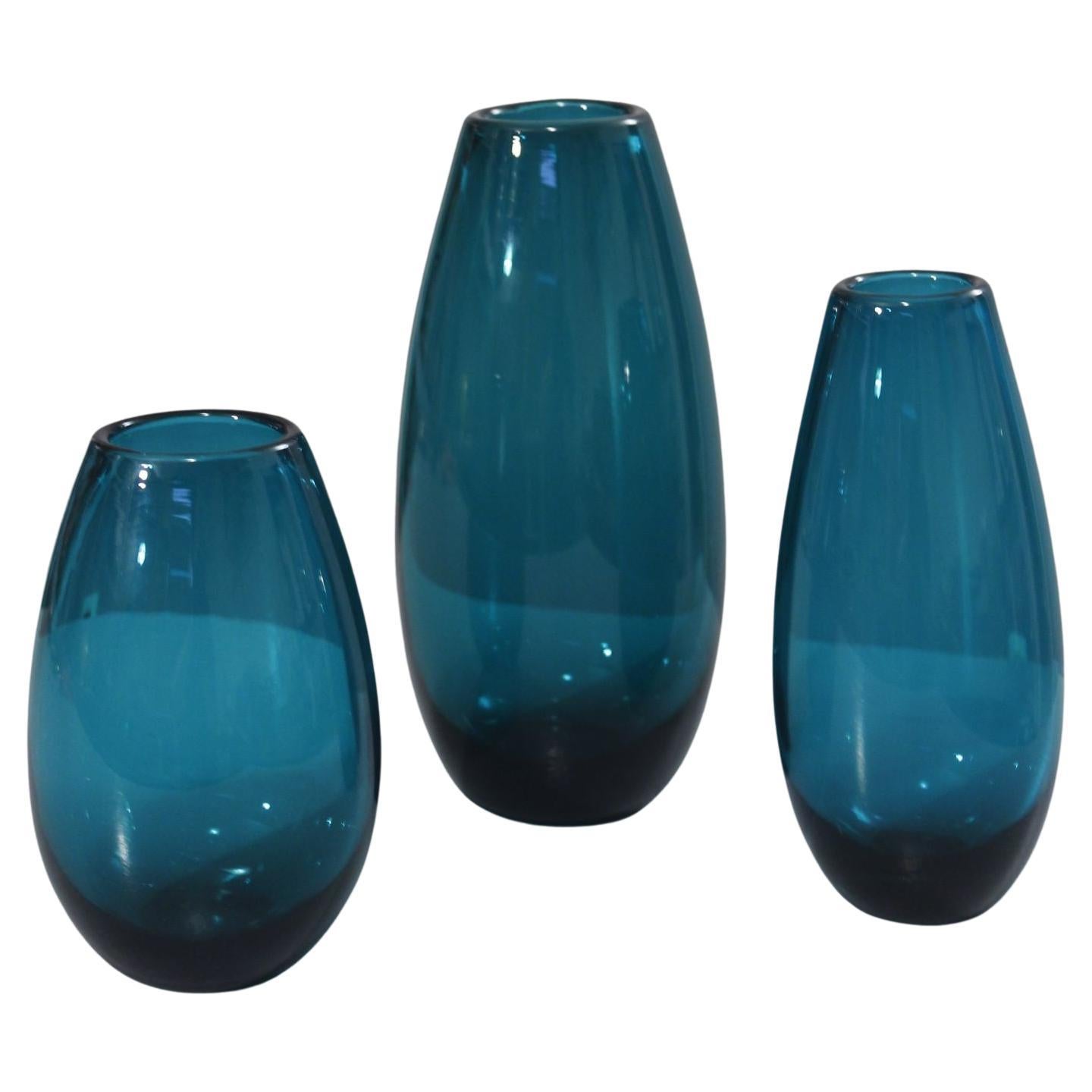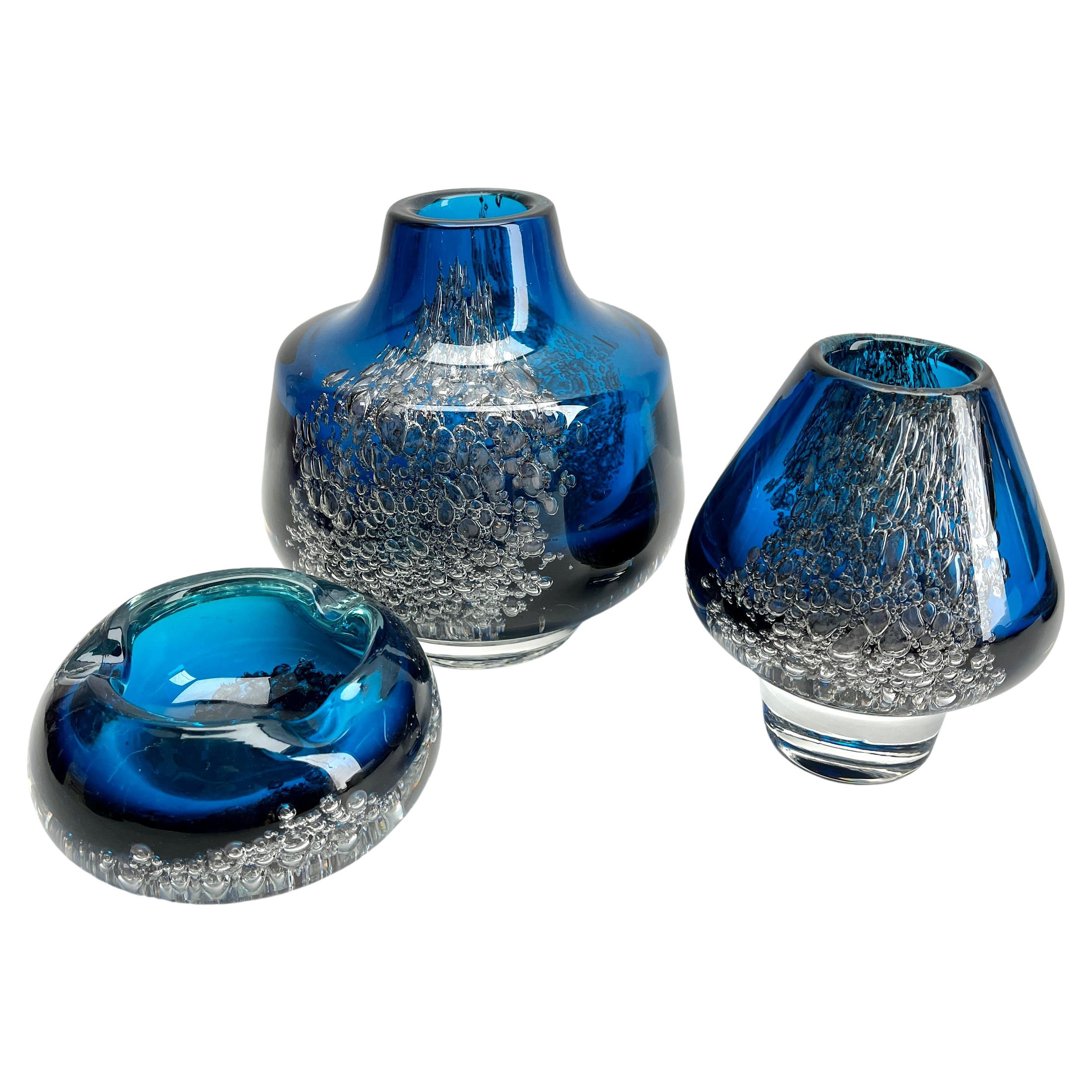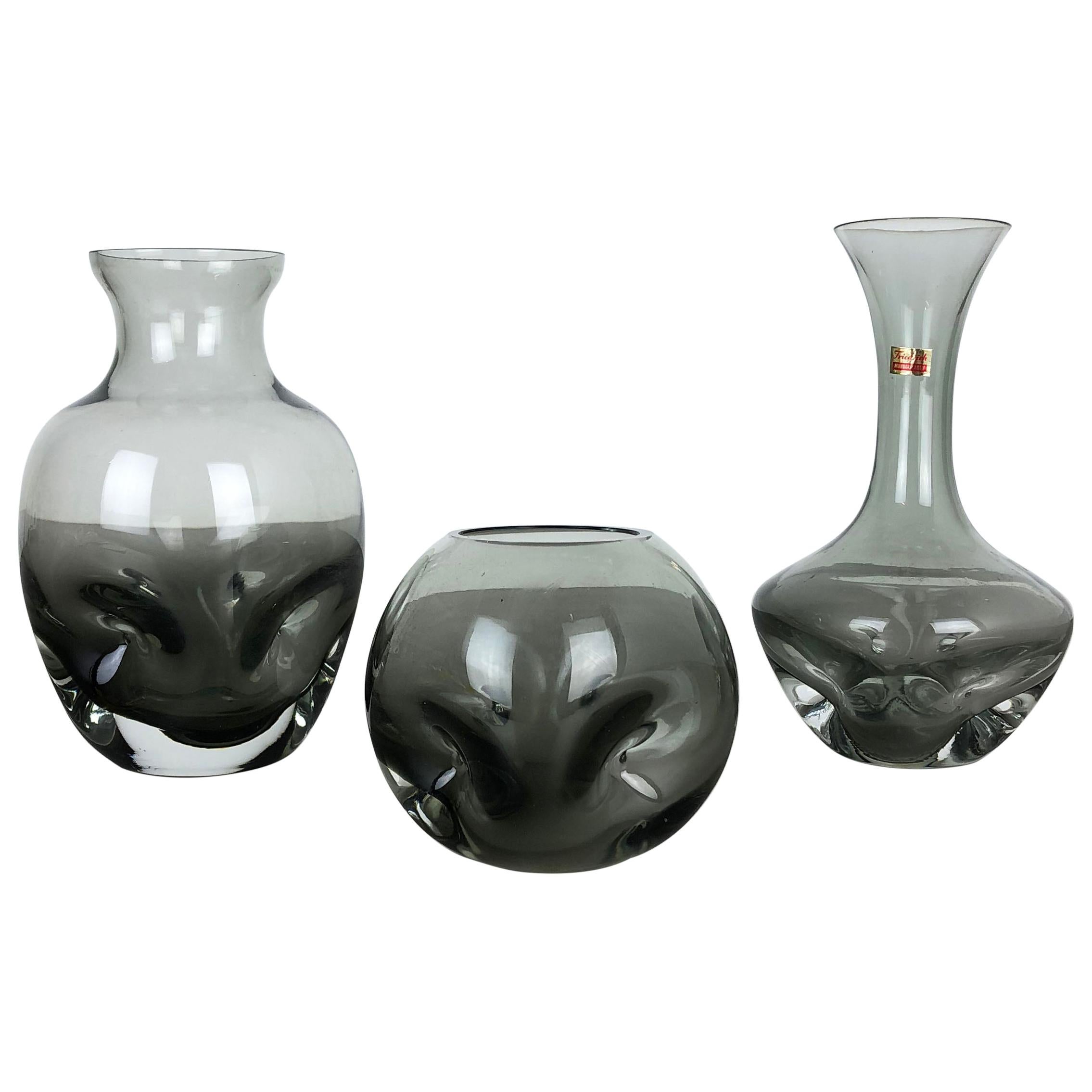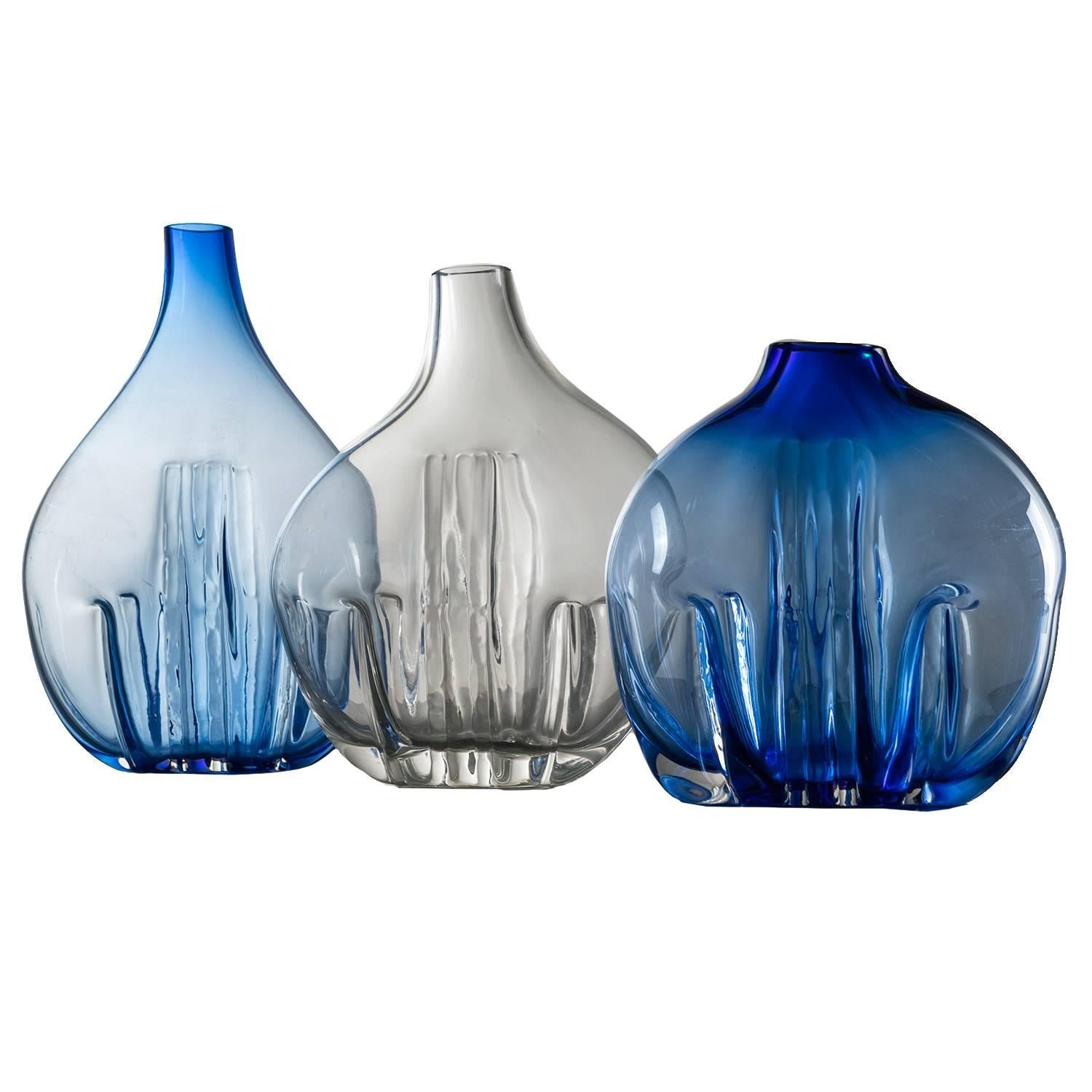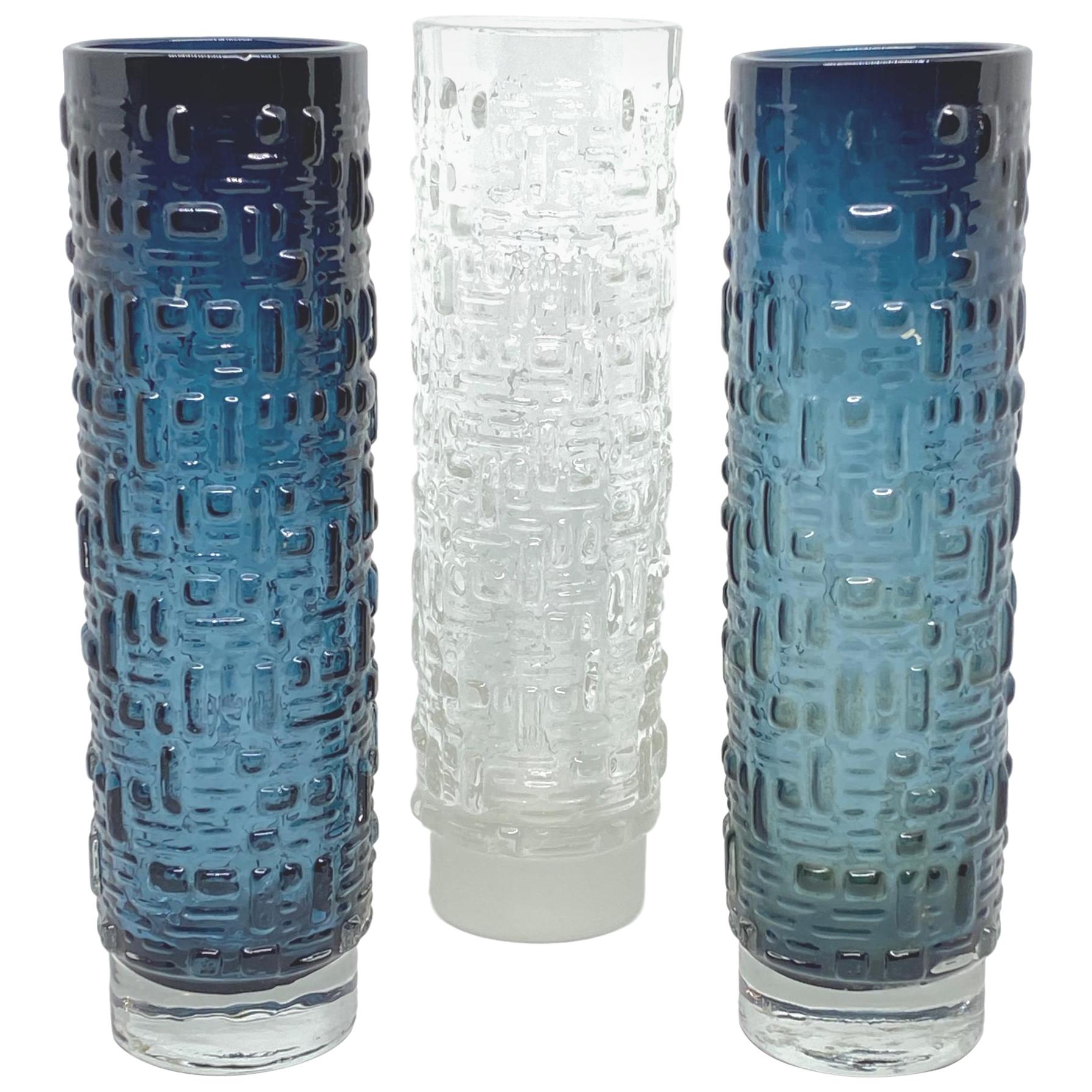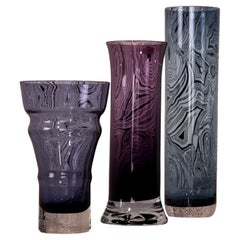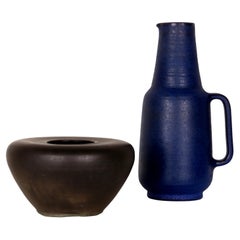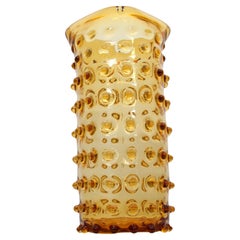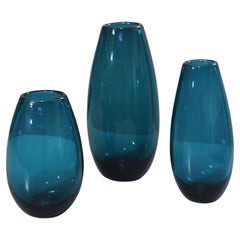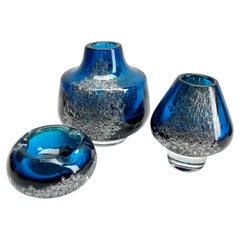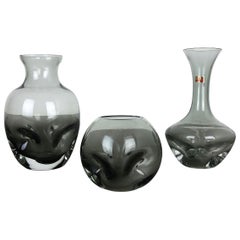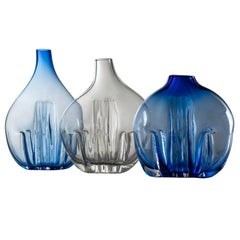Items Similar to gorgeous BUBBLE ART GLASS Trio by „Heinz“ Löffelhardt late 1960s Set of 3 Vases
Want more images or videos?
Request additional images or videos from the seller
1 of 21
gorgeous BUBBLE ART GLASS Trio by „Heinz“ Löffelhardt late 1960s Set of 3 Vases
$759.51per set
£567.09per set
€640per set
CA$1,067.09per set
A$1,167.54per set
CHF 602.45per set
MX$13,981.19per set
NOK 7,648.37per set
SEK 7,165.78per set
DKK 4,875.06per set
About the Item
As a collector of artful glass I´d like to present one of my favourite late 1960s Bohemian Wood/Bavarian Wood pieces
"FLORIDA"
here this SET of 3 BUBBLE STATEMENTS
"FLORIDA"
meaurements: from tall to small:
25cm high ~ Ø max 12cm ~ Ø inner mouth 3.5cm ~ Weight 2.4 Kg
18cm high ~ Ø max 10cm ~ Ø inner mouth 4.5cm ~ Weight 1.3 Kg
12 cm high ~ Ø max 11cm ~ Ø inner mouth 4cm ~ Weight: 0.85Kg
Total weight: 4. 55 Kg
~~~~~~~~~~~~~~~~~~~~~~~~~~~~
Heinrich Löffelhardt
Heinrich “Heinz” Löffelhardt (* December 24, 1901 in Heilbronn; † May 22, 1979 in Stuttgart) was a German designer who played a key role in shaping industrial design in West Germany in the 1950s and 1960s and is considered one of the main representatives of Good Form. Some of his porcelain and glass designs for Arzberg and Schott-Zwiesel are still produced today.
After graduating from high school in 1920, Löffelhardt began an apprenticeship at the Heilbronn silverware factory Peter Bruckmann & Söhne. The senior boss Peter Bruckmann gave Löffelhardt a scholarship to study sculpture with Georg Kolbe in Berlin from 1924. Only a few portrait busts created in the following four years have survived in private collections. The young sculptor returned to industry as a freelance designer. From 1934, Löffelhardt developed canteen tableware on behalf of the “Beauty of Work” office, which was manufactured by Bauscher Bros. and Keramische Werke Bohemia in Neurohlau, among others. In 1937, Rosenthal delivered the 700 “Beauty of Work” tea service designed by Löffelhardt to the Reich Labor Service. Characteristic features were the onion-shaped, smooth body of the teapot with a finger-wide neck ring, the curved tubular spout and the ribbon handle. Even before the Nazi tableware, Rosenthal's subsidiary Thomas had launched the Barb tableware design on the market. In 1937, Wilhelm Wagenfeld hired the up-and-coming designer Heinrich Löffelhardt as an employee of Vereinigte Lausitzer Glaswerke in Weißwasser.
Career
In 1941, Löffelhardt was drafted into the Wehrmacht and only returned from Soviet captivity in 1947. Immediately after the war, there were few prospects in the economy, so he initially followed Wagenfeld, who had moved from East to West Germany, to Stuttgart and in 1949, on Wagenfeld's recommendation, was given a job in the Design Department of the State Trade Office in Stuttgart. Among other things, he edited the catalogs for the exhibitions “Wie wohnen” (Stuttgart and Karlsruhe, 1949-50) and “Glas aus Württemberg-Baden” (Stuttgart, 1950), which were published by Gerd Hatje. After Wagenfeld's retirement, who set up his own business as a designer, Löffelhardt became his successor as head of department at the State Trade Office in 1950. Löffelhardt's particular achievement here was to make it easier for the domestic industry to catch up with international design developments after years of isolation: the exhibitions and publications for which he was responsible paid particular tribute to developments abroad. Löffelhardt proved to be a man of practice, not a verbose theorist.[4] At the same time, he was once again designing for industry. He designed standing vessels for the Sicherer'sche Apotheke in Heilbronn; the Gral-Glaswerkstätten Göppingen produced his stacking ashtrays.
Arzberg and Schönwald porcelain factories
At the end of 1952, he became artistic director of the Arzberg and Schönwald porcelain factories and was thus responsible for almost the entire product range. The design of both companies had been inextricably linked with the name of the designer Hermann Gretsch since 1931, and Gretsch's “timelessly modern” line was to be continued and further developed. Heinrich Löffelhardt designed three models in 1954/55 (Arzberg 1542, Arzberg 2000, Schönwald 411), which were based on Gretsch's pre-war designs, but replaced their stolidity with an elegant sweep. The award-winning Arzberg 2000 and Arzberg 2025 designs in particular seem to reflect something of the optimism of the years of the economic miracle.
The Schönwald 511 and Arzberg 2050/2075 models feature truncated cone and cylinder shapes, but their novel geometric rigor did not become dogma in the following years.
The Arzberg 1100 stacking bowls, whose precise, rectangular shapes placed particular technical demands on the production department, were also launched in 1960. The idea of creating a multitude of possible uses with just a few - in this case six - pieces by combining them in different ways was new. This form of multifunctionality of combination dishes has been copied many times and has proven itself to this day.
In his last design, Arzberg 2007 Residence, Löffelhardt returned to organic forms in 1969, emphasized by a slight fluting of all parts.
For two decades, Löffelhardt determined the overall appearance of the tableware and gift items produced by Arzberg. The photographer Willi Moegle captured many of Löffelhardt's works. These photographs, which were mainly taken for advertising purposes, are now regarded as classics of modern product photography.
Glass designs
From 1954, Löffelhardt was responsible for the design of utility glass at Jenaer Glaswerk Schott & Gen. in Mainz, including the subsidiary Vereinigte Farbenglaswerke Zwiesel. He designed goblets, bottles and vases. The Sintrax coffee machine was functionally optimized. Löffelhardt's borosilicate glass teapot, which was produced in 1955 by Schott & Gen. Mainz in 1955 to replace Wilhelm Wagenfeld's previous design from 1931, was named one of the 25 best contemporary design achievements by the US magazine Fortune in 1977.
The fact that Löffelhardt replaced Wilhelm Wagenfeld as designer at Schott & Gen. Mainz, where Löffelhardt had replaced Wilhelm Wagenfeld as designer, led to a lasting rift between the two designers. In the literature, Wagenfeld's replacement is attributed to excessive fee demands. Löffelhardt replaced Wagenfeld's designs with a more modern program, both in the area of blown glass (tea sets) and pressed glass (baking tins).
Technical design
Like most designers of the 1950s and 1960s, Löffelhardt devoted himself above all to taste goods. But he was also interested in the aesthetic side of new technical devices. In 1958, together with his protégé Hans Erich Slany, he designed the compact camera “Zeiss Ikonette” for Zeiss Ikon, one of the first cameras with a plastic housing.
Late years
Löffelhardt was appointed to the supervisory board of the Arzberg and Schönwald parent company Kahla in 1959 and to the supervisory board of Vereinigte Farbenglaswerke in 1963. His achievements were recognized, but his professional advancement did not mean that his ideas of socially responsible design came any closer to implementation. Progressive automation in production and corporate concentrations contributed to the rapid displacement of Löffelhardt's work. In 1971, he retired as artistic director of the companies. His work for Schott-Zwiesel also ended in 1977.
In 1976, Heinrich Löffelhardt was made an honorary member of the Association of German Industrial Designers, and one year before his death he was elected an honorary senator of the Stuttgart Academy of Arts.
Designs (selection)
1950: Arno Kiechle, ointment jars (majolica)
1952: Gral-Glashütte, jugs C 90
1953: Schönwald, Form 411
1954: Schwandorf, shape 954 (earthenware)
1954: Arzberg, shape 2000
1955: Jenaer Glas, teaware
1955: Schönwald, shape 398
1956: Vereinigte Farbenglaswerke, goblets 1007
1957: Arzberg, shape 2025
1957: Arzberg, set of bowls 1100
1957: Schönwald, shape 511
1958: Jenaer Glas, cocoa jug
1959: Arzberg, shape 2050
1961: Schönwald, shape 498
1962: Arzberg, salt shaker and pepper mill 1529
1963: Vereinigte Farbenglaswerke, vase series 5073
1963: Schönwald, shape 611
1963: Arzberg, shape 2075
1964: Arzberg, shape 2200
1964: Schönwald, shape 598
1966: Vereinigte Farbenglaswerke, goblet glass series 1027 Freesia
1967: Schönwald, shape 698
1967: Arzberg shape 2300
1968: Arzberg, shape 2375
1969: Jenaer Glas, refractory glass tableware 2000
1970: Vereinigte Farbenglaswerke, goblet glass series 1089 Charlotte
- Creator:Heinrich Loffelhardt (Designer)
- Dimensions:Height: 9.85 in (25 cm)Diameter: 4.73 in (12 cm)
- Sold As:Set of 3
- Style:Mid-Century Modern (In the Style Of)
- Materials and Techniques:
- Place of Origin:
- Period:
- Date of Manufacture:ar. 1967
- Condition:
- Seller Location:Landshut, DE
- Reference Number:1stDibs: LU8587244115632
About the Seller
5.0
Vetted Professional Seller
Every seller passes strict standards for authenticity and reliability
1stDibs seller since 2023
22 sales on 1stDibs
Typical response time: 7 hours
- ShippingRetrieving quote...Shipping from: Landshut, Germany
- Return Policy
Authenticity Guarantee
In the unlikely event there’s an issue with an item’s authenticity, contact us within 1 year for a full refund. DetailsMoney-Back Guarantee
If your item is not as described, is damaged in transit, or does not arrive, contact us within 7 days for a full refund. Details24-Hour Cancellation
You have a 24-hour grace period in which to reconsider your purchase, with no questions asked.Vetted Professional Sellers
Our world-class sellers must adhere to strict standards for service and quality, maintaining the integrity of our listings.Price-Match Guarantee
If you find that a seller listed the same item for a lower price elsewhere, we’ll match it.Trusted Global Delivery
Our best-in-class carrier network provides specialized shipping options worldwide, including custom delivery.More From This Seller
View AllSET of 3 glassvases ASEDA by Bo Borgström & WMF amethyst gray-blue violet vase
By Bo Borgstrom
Located in Landshut, BY
1960s
3 VASES
ASEDA: H / Height: 21 cm ~ DM / Diameter: 7cm
WMF CYLINDER: H / Height: 26cm ~ DM / diam.: 7cm
Chalice shaped vase / Purple Chalice : H / height: 16cm ~ DM / diam.: ...
Category
Vintage 1960s Swedish Scandinavian Modern Vases
Materials
Art Glass
shapely Fruit or Punch Bowl or VASE mouth blown glass Sweden around 1968
Located in Landshut, BY
multiuse shapely
Fruit or Punch Bowl
or VASE or Cachepot
mouth blown glass
Sweden
around 1968
in perfect condition
Category
Vintage 1960s Swedish Scandinavian Modern Glass
Materials
Blown Glass
SET of 2 art pottery Vases late 60s by Barbara Lampe :: Anton Lang Oberammergau
Located in Landshut, BY
"Set of two masterfully crafted vases by Barbara Lampe, granddaughter of company founder Anton Lang from Oberammergau (January 17, 1875 - May 30, 1 938) was a German studio potter an...
Category
Vintage 1970s German Mid-Century Modern Vases
Materials
Pottery
att. Barovier Seguso & Ferro Murano Art Glass Vase Honey Amber Italy late 1940s
By Barovier Seguso & Ferro
Located in Landshut, BY
A beautiful huge Murano art glass vase in the manner of Barovier Seguso & Ferro in honey yellow amber colour, Italy,
circa mid / late 1940s
It stays in very good original conditio...
Category
Vintage 1940s German Mid-Century Modern Vases
Materials
Art Glass
$625 Sale Price
58% Off
a pair of 1950s Studio Keramik floor Vases Atelier Berta Huber Roethe Landshut
Located in Landshut, BY
an amazing set of 2 STUDIO KERAMIK FLOOR VASES
by Atelier Herta Huber Roethe Landshut 1950s
Manufacturer HUBER ROETHE
Design Period 1950 to 1959
Production Period 1950 to 1959
C...
Category
Vintage 1950s German Mid-Century Modern Vases
Materials
Pottery
$833 Sale Price / set
69% Off
a quite unique art pottery vase Italy 1970s (appears to be composed of glass ! )
Located in Landshut, BY
This is an exceptional example of Italian design and craftsmanship.
The jug-style vase with a handle initially appears to be composed of glass. Upon closer examination, it becomes ...
Category
Vintage 1970s Italian Mid-Century Modern Vases
Materials
Pottery
$493 Sale Price
20% Off
You May Also Like
Set of 3 blown glass vases by Karl Friedrich, Germany 1960s
Located in STRASBOURG, FR
Set of three blown glass vases by Karl Friedrich Kristall Glas, Germany circa 1960.
All in good condition, two small scratches.
Dimensions:
1:...
Category
Vintage 1960s German Mid-Century Modern Vases
Materials
Glass
Set of 3 Vases by Heinrich Löffelhardt for Schott Zwiesel, 1950s
By Schott Zwiesel, Heinrich Loffelhardt
Located in Verviers, BE
Designed by Heinrich Löffelhardt and manufactured by Schott Zwiesel. Heinrich’s design activity was at its Zenith during the 1950s-1960s. He became especially interested in the use o...
Category
Mid-20th Century German Mid-Century Modern Vases
Materials
Glass, Art Glass
Set of 3 Cubic Hand Blown Crystal Glass Vase by Friedrich Kristall Germany 1970s
Located in Kirchlengern, DE
Article:
Glass vases set of 3
Producer:
Friedrich Kristall, Germany
Decade:
1970s
Original super rare vintage Vase set des...
Category
Mid-20th Century German Mid-Century Modern Vases
Materials
Glass
Set of Three Murano Glass Vases by Toni Zuccheri, Italy, 1970s
By Toni Zuccheri
Located in Milan, IT
Outstanding Murano glass vases by Toni Zuccheri.
The piece is part of an experimental collection with crystal glass made by Zuccher...
Category
Vintage 1970s Italian Vases
Materials
Murano Glass
Set of 3 Glass Vase by Emil Funke for Gral Glass, circa 1970s
By Gral Glass
Located in Nuernberg, DE
Wonderful Mid-Century Modern German vases by Gral Glass, designed by Emil Funke, circa 1970. These beautiful petrol colored and clear vases bring a touch of...
Category
Vintage 1970s German Mid-Century Modern Vases
Materials
Glass
Set Of Three Swedish Midcentury Glass Vases
Located in Kent, Dover
A set of three Mid-century Swedish hand-blown glass vases. Comprising a large lime green vase of irregular shape, a large fluted vase with a hollow cobalt blue base and opaque bubble...
Category
Vintage 1960s Swedish Mid-Century Modern Glass
Materials
Blown Glass
$1,411 / set
More Ways To Browse
Pepper Mill
1950 Vintage Salt And Pepper Shakers
Salt And Pepper Shakers Porcelain
Silver Salt And Pepper Mill
Pressed Tin
Salt Pepper Mill
Salt And Pepper Mills
Vintage Arzberg Porcelain
Vintage Blue Glass Salt And Pepper Shakers
Heinrich Loffelhardt
Kahla Vintage
Camera Compact
Vintage Baking Tins
Shot Glass Tequila
Steuben Pedestal Bowl
Steuben Teardrop
Steuben Verre De Soie
Tiffany Crystal Wine Glasses
